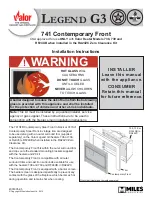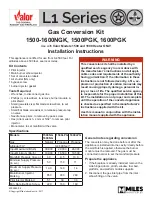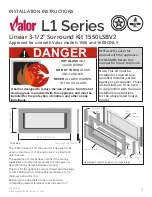
SEISMIC RESTRAINT
New Zealand regulations require that flued gas heaters be secured to prevent shifting in the event of an
earthquake. This is best done by fastening the heater to the floor right through the floor protector if one is fitted.
Fasten with two screws not less than 12 gauge or the equivalent in coach screws or toggle fasteners. Anchor the
appliance through the holes in the seismic restraint bracket or in the two angle brackets supplied. The angle
brackets attach at each side of the pedestal. If the seismic restraint bracket is used, it can be fastened to the rear
of the pedestal either before or after fitting the anchor screws. The small centreline hole in the bracket will help in
pre-positioning it.
Angle Bracket
Screw
Centreline Hole
Secure through
these holes
Seismic Restraint Bracket
Spire clip
Screw
TEST FIRING
It is absolutely essential that the installer test fires the heater before leaving the site.
If fitted, open the gas supply valve at the rear of the heater and check all gas joints for leakage using a leak check
solution or an electronic ‘sniffer’, NOT a naked flame.
Test fire the heater, following the lighting instructions on pages 2, 3 and 4 of this manual.
First check that the pilot light ignites satisfactorily. Initially it may take several attempts until the air is purged
from the pipeline. Once it has lit, extinguish it again and verify instant re-ignition.
Using the appropriate procedure as detailed for the heater model, light the main burner to verify satisfactory
ignition and cross-lighting. Repeat this procedure several times. Always wait two or three minutes after turning
off the main burner before lighting it again. The main burner should be test run for at least ten minutes.
After the fire has been alight for five minutes on ‘HIGH’, hold a smoking taper or match at the exit of the
draught hood (behind the heater) to verify that the flue is drawing correctly and that flue gases are not spilling
into the room.
Drawn in: No spillage
Blown out: Spillage/Backdraughting
10






































